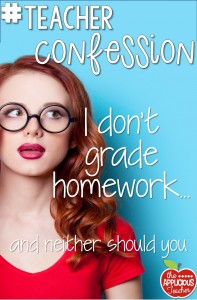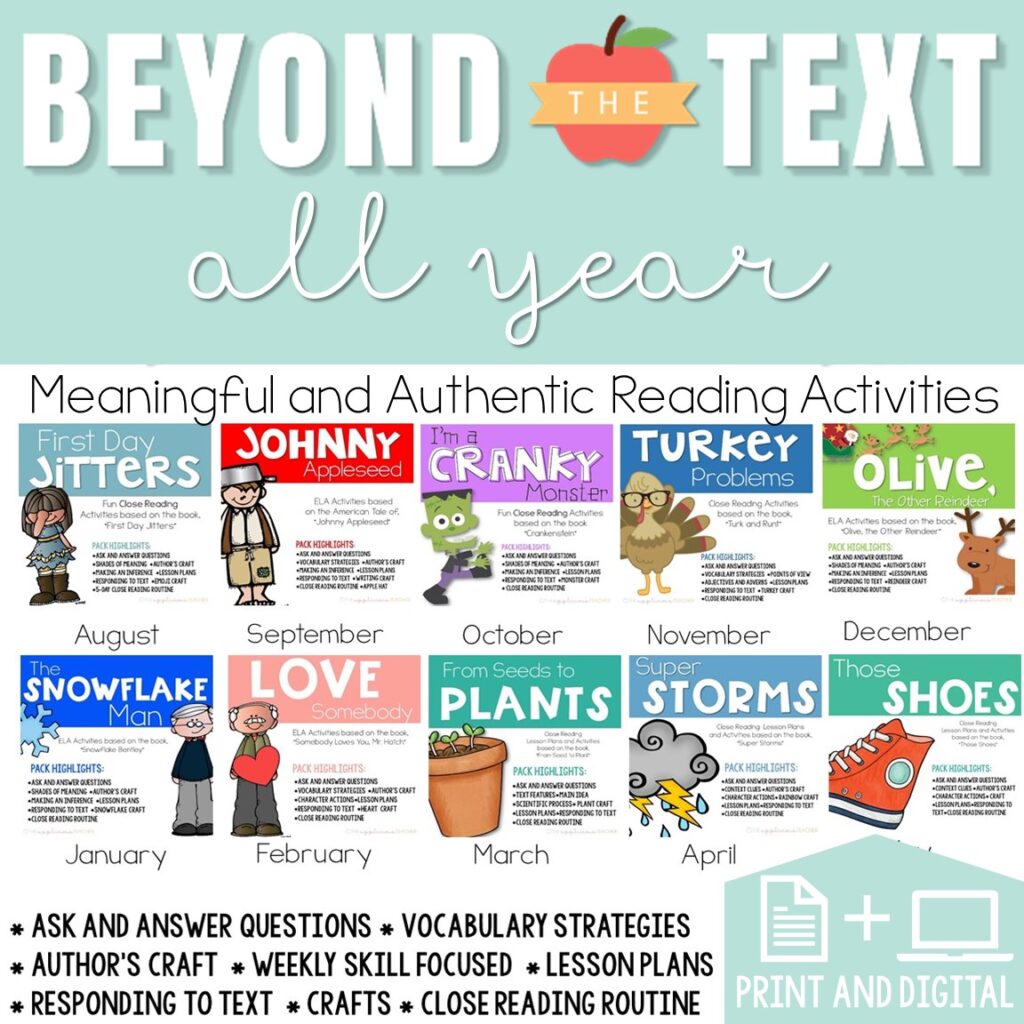But either way… I have to confess…
I don’t grade homework.
There. I said it!
Now don’t throw tomatoes at me! Hear me out on this!
Not only do I NOT grade homework… I barely look over it. As in… I have a checklist of students that I have a parent volunteer or student check off, but that’s pretty much it. I don’t spend hours looking over papers from the night before.
I also don’t “punish” my students for not doing their homework. They don’t sit out at recess, they don’t lose points. Nothing. If a kid tells me he didn’t do his homework, I give a look and ask them to be more responsible.
That’s it.
Ludicrous, I know… You’re ready to aim! But hear me out on this one!
I’m not a fan of homework personally. I’ve written about that topic before (here). I’m a big believer in letting kids be kids. I want kids to run outside and play when they get home, not be slumped over the kitchen table as they brood over their continued lessons of the day. Didn’t they just spend the last six hours doing that?
Also, in the early grades, teachers know the majority of homework is spent with a parent acting as a task manager. Is that work on the paper even theirs? Or worse, I’m punishing a student who goes home to an empty house all afternoon and has to watch their younger sister and possibly cook dinner. How can I be upset with that student?
But, my district has a homework policy and, as the ever model teacher, I assign it. So I justify it by thinking…homework is that it is not for me.
I’ll repeat that again: Homework is NOT for me, the teacher!
For me, homework is for the student and parent. This holds especially true for students in grades k-3. Let’s be honest folks, how many 7-year-olds do you know that are 100% self-sufficient and complete their homework without one look from a parent? Few… if any… And if that was the case, I’d be saddened by it. Homework serves as a connection of the classroom at home. It’s a time for parents to see and be involved in their child’s learning in a way that is meaningful and non-threatening. Homework should serve as a reinforcement of what’s happening in the classroom and a way for those skills to be communicated in the home.
Research on Homework
Let’s talk research, shall we? I know I like cold hard facts. There have been TONS of studies on homework. Here’s a few and their findings…
The Cold Hard Facts…
–Mikk
(2006) examined the correlation between homework and math achievement in forty-six countries. Student achievement was lower in countries where homework counted toward grades, where it was the basis for classroom discussion, and where students corrected homework in class.
– Swank
(1999) examined the differences in test scores among fourth graders who either did or did not do homework. Her findings indicated no differences in math achievement scores between students in the two homework groups.
Sum it Up…
CenterofPublicEducation.org summed up all those numerous studies on the correlation between homework and student achievement. According to their findings, the research is all over the place and varies with grade, age, and parental involvement. But, some of the research overlapped enough to help debunk a few myths…
Does homework affect student learning?
Myth 1: Homework increases academic achievement.
What researchers say: Cooper (1989a) argues that reviews on the link between homework and achievement often directly contradict one another and are so different in design that the findings of one study cannot be evaluated fairly against the findings of others.
Myth 2: Without excessive homework, students’ test scores will not be internationally competitive.
What researchers say: Information from international assessments shows little relationship between the amount of homework students do and test scores. Students in Japan and Finland, for example, are assigned less homework but still outperform U.S. students on tests (Organisation of Economic Cooperation and Development 2004). Other studies find a positive relationship in math, but not in reading (Fuchs et al. 2004).
Myth 3: Those who question homework want to weaken curriculum and
pander to students’ laziness.
What researchers say: Kralovec and Buell (2001) note that homework critics rarely question the work assigned but rather the fact that the work is so often performed at home without adult supervision to aid the learning process.
See more at: http://www.centerforpubliceducation.org/Main-Menu/Instruction/What-research-says-about-the-value-of-homework-At-a-glance/What-research-says-about-the-value-of-homework-Research-review.html#sthash.oU4HY5FV.dpuf
What to do instead, then?
So if traditional homework isn’t as effective in increasing student achievement, I prefer not to expound too much energy there. See the logic?
So let’s set that tomato down…on the table…(The one you used to spend hours at grading homework)
Now, that’s not to say we shouldn’t be assigning homework AT ALL… I think homework in the higher grades is a must. It helps foster independence and self-pacing. Things that college-bound students need to achieve. (More research on that…)
There are definite benefits to homework in the younger grades as well. But we need to be purposeful in our assignments. Homework shouldn’t just be busy work.So here’s some food for thought…Looking at just these handfuls of studies, we can see that homework can help, if it’s done in a positive way.
Cases for making homework meaningful:
Van Voorhis (2003) examined the association between homework and science achievement in middle school grades. Van Voorhis found that students who completed more science homework earned higher science grades on their report cards. She also noted that interactive assignments—those that require interacting with other students or with parents—and parent involvement were important factors in ensuring homework’s effectiveness.
De Jong, Westerhof, and Creemers (2000) Through their multi-level analysis, the researchers found that the amount of homework was the only factor related to achievement—and that
it accounted for only 2.4 percent of the difference in achievement between students who did homework and those who did not. Notably, the frequency of homework assignments and the amount of time students spent on them were not related to achievement.
See more at:
http://www.centerforpubliceducation.org/Main-Menu/Instruction/What-research-says-about-the-value-of-homework-At-a-glance/What-research-says-about-the-value-of-homework-Research-review.html#sthash.Tya3D43G.dpuf
Meaningful Homework
(Notice spelling words 3 times each is not on here… )
So, the takeaway? Don’t stress over homework. Don’t spend your valuable time grading it and checking it in! Your time should be better spent on more effective teaching practices, like giving meaningful feedback, designing
interdisciplinary lessons, and teaching kids! Instead, use it as a way to communicate to parents at home as to what their child is learning in school. Also, make the homework as meaningful as possible.
Projects, creative writing, research: all great things that can be done at home that add to the classroom experience.
And for goodness sake:
DON’T GRADE IT!
If a child is struggling with completing homework, find out why. Is it because it is too hard? Too easy? Or is it because they are busy taking care of themselves when they get home? Once you’ve figured it out, you can adjust your homework accordingly. Let’s make it a more meaningful experience instead of a dreaded one.
So, I’ll just take that tomato now… and you’re welcome for crossing one thing off your to do list this year. 😉
What’s your take on the homework debate? I’d love to keep this conversation going. Comment below!

Sign up to snag these!

Receive all these classroom management tools right to your inbox!
Success! Now check your email to confirm your subscription.













